

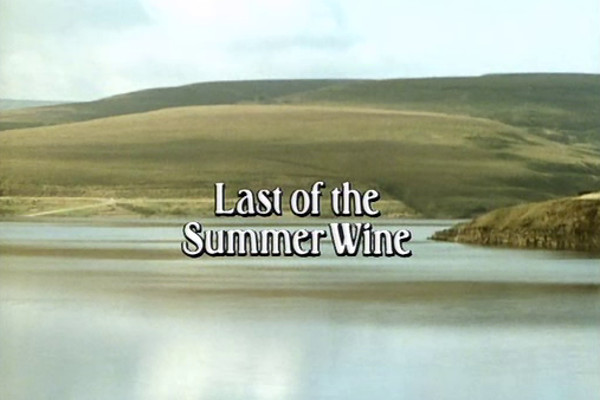
REVISED May 2021: Updated information on the ratings of the show.
Series Nine was the longest run of Last of the Summer Wine, lasting a dozen episodes, along with three specials, and is available to buy online from Amazon. Please join me as I rank the series from worst to best...
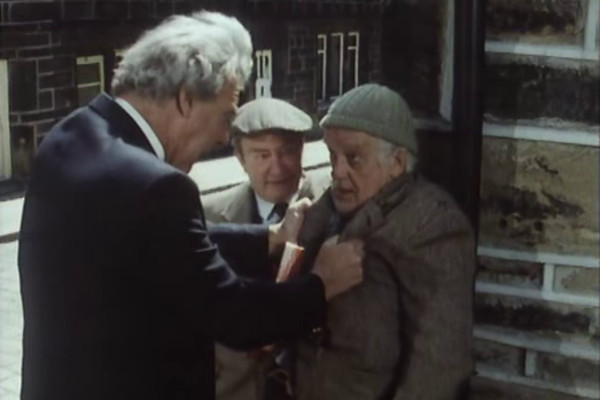
A feature-length special that aired on New Year's Day 1986, and had the daunting task of introducing multiple new characters. Last of the Summer Wine did end up being something of a retirement home for old sitcom actors, giving us over the course of its run: Mr Lucas and Captain Peacock from Are You Being Served?, George from George and Mildred, Blakey from On The Buses and June from Terry and June. To add to this, we also had Burt Kwouk, Russ Abbot, Cannon and Ball, Norman Wisdom and Hilda Ogden from Coronation Street. While all obviously played different characters, their appearance and acting styles were too well-known to do anything other than remind viewers of their more famous associations.
We get the first glimpse of this here, with Mike Grady introduced as "Barry". Grady, of course, had spent four years as "Ken" in Citizen Smith. Grady's inclusion is as a new regular character, along with Sarah Thomas, playing his wife, Glenda. As both were in their 30s, it also marks a transition towards having younger characters in the programme, begun in the previous series by the debut of Crusher, played by Jonathan Linsley, who was in his late 20s.
The special also acknowledges, for the first time in the programme, that Sid is no longer alive, as Ivy speaks about going to the crematorium. Also in there is a reason for Foggy leaving mid series, with the unlikely revelation that he'd inherited a decorative egg business. Yet the big addition to the series is a new "third man", with Michael Aldridge as Seymour Utterthwaite, a headmaster turned inventor.
Aldridge was reportedly a very amiable man behind the scenes, with none of the friction between the cast that had taken place in its earlier years. However, for once a character comes into the series not fully formed. While Seymour's "inventor" status seems a painfully contrived way to get Compo to take part in a new stunt each week, it made for a passable replacement for Foggy, with some occasional highlights.
However, the version of Seymour here is, as pictured, very aggressive compared to what came later, and "eccentric" in a jarringly manufactured way. Worst of all, his hostile relationship with Compo and Clegg sees him end the episode not wanting to be friends, but wanting them as employees who would work for him, unpaid, and never associate with him on a level that could be regarded as socialising.
It's a bad start in a particularly unfunny instalment, the non-use of a laughter track making it even more apparent how desperate the whole thing is. Thankfully, the character was revised, and returned a much mellower, affectionate man in the same year's Christmas special, Merry Christmas Father Christmas.
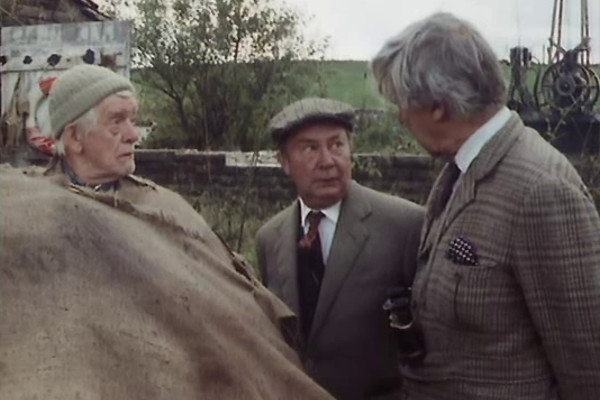
With series nine, the programme had already entered its "ubiquitous" phase, an oft-repeated show that never seemed to be off the air. The entire series nine, plus two specials, were shown again before the year was out, meaning Last of the Summer Wine was broadcast on the BBC for exactly half the year.
In all this, it's unclear how popular Seymour was. Reviewed in The Stage after the third episode of the series aired, James Green acknowledged that Seymour had an "early bumpy ride", but had "become less dotty and now seems part of the team." However, Green also forewarned of the series' cancellation, noting that the programme "is well-acted and produced, and wiles (sic) away the time in a low-key relaxed manner. But there ought to be more to a peak-hour programme than that." Thankfully this cancellation came quite a lot later than Green predicted.
Despite earlier versions of this article explaining that locating the viewing figures is hard, the ratings for all the episodes, except for Big Day At Dream Acres, have now been located. While the figures had dropped from Foggy's time on the show, and the BBC as a whole was getting beaten in the ratings by ITV, the average of 12 million people tuning in was still a considerable audience, even if it was only enough to average 18th place in the charts. As for the two specials, then Uncle of the Bride placed third with 18.1 million, and Merry Christmas, Father Christmas sixth with 16.3 million.
As for this opener, then it's a strange oddity, presenting the programme as a full ensemble show, presumably because of the gap between Seymour's introduction. As a result it's over 13 minutes in before Compo, travelling solo, meets up with Clegg, and almost 20 minutes before they catch up with Seymour. While there Seymour's "dotty uncle" persona is a little too contrived, the programme now far away from the semi-political, semi-realistic world of the early 1970s, and now into something that bears little resemblance to reality. Another issue is Ronnie Hazlehurst's increasing dominance, allowing the incidental music to not just underscore the jokes, but actually become the jokes. A parody of the Dallas theme as Compo drills for oil is a particular low point for the programme.
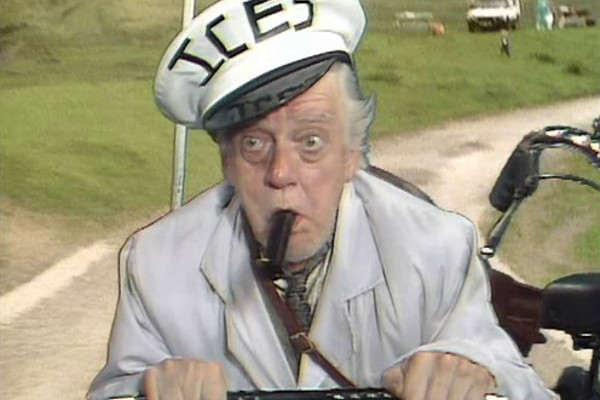
This episode does, inevitably, end up with Compo going down a steep hill on a runaway vehicle, but here the interest isn't with the three leads, but the supporting characters. There's Nora Batty getting lines like "a marriage stands a chance if it's built on a sound basis of unexcitement", as well as the further development of Pearl. While Howard and Marina are one-joke characters (or perhaps even no-joke characters) what is intriguing about Pearl is that she's still uptapped as a character at this stage.
What's especially striking is that, while she eventually grew into the role as a woman in her 60s, here it's all costume and make up creating the illusion. Actress Juliette Kaplan was still only in her late 40s at this point, and was over 14 years younger than her onscreen husband in real life. Jean Fergusson, playing the "younger woman" was actually closer to Kaplan's age, with just five years between them. The year-end Christmas special, Big Day At Dream Acres, gave Kaplan a rare chance to emerge from under the inhibiting make-up.
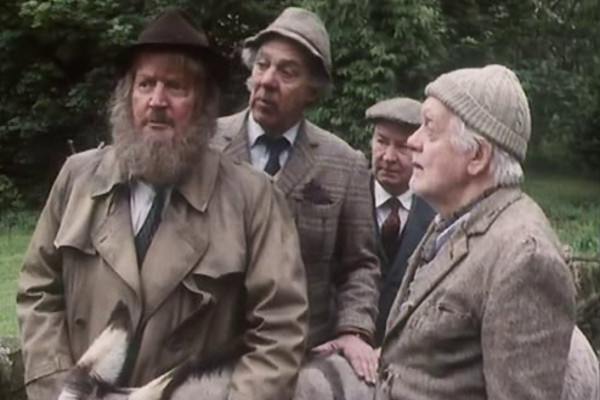
The third and final "feature film" of Last of the Summer Wine. While the programme would still occasionally trot out hour-plus specials (and, indeed, on film) this was the last time it would go out without a laugh track.
The first attempt, 1983's Getting Sam Home, was a highlight of the entire series, largely because it attempted something different in tone. Sadly, this December 1987 special is just like an extended regular episode, with the same trappings and cues as the real thing. What this means is, without the audience laughter, it can seem like a lot of dead air... or, worse, really quite sinister.
Throughout this "virgin view" of the programme, I've made it clear from the start that I never saw the humour in Compo's "sex pest" vibes, but it's even more disturbing to see him touching up Nora Batty without an over-enthusiastic studio audience reassuring viewers that it's "just fun". Guest characters take on different tones, too... the heated bickering of married couple "Gary and Vi" would perhaps have induced titters from the easily-pleased regular audience, but, with their every aggressive spat thrown into the ether, it instead seems like a prelude to domestic violence.
As a half hour entry, this may have been okay, but it's an oddly listless special, not helped by an obviously fake "donkey" that gets involved in the farcical plot. Add to this a very obvious stuntman for Compo's role, and a pantomime horse - something that was too childish for Rentaghost, three years earlier - and it's quite a lacklustre special.
The special was also the last episode to feature Jonathan Linsley as Milburn. With the BBC unable to confirm the roles of many of the supporting cast from year to year, there was a lack of job security, and so Linsley was working on other projects with no guarantee of his return. When the BBC confirmed that Crusher would be returning in Series 10, Linsley had lost around 14 stone in weight for health reasons, making his position untenable.
As Crusher no longer looked like Crusher, the part was never reprised, though Linsley would play Jane Freeman's "toy boy" as his newly-slim self in ads for John Smith's bitter. (in an interview with the Summer Winos site, Linsley stated that he earned more money for the six commercials than he did for 20 episodes of Last of the Summer Wine). Sadly, unlike Wally Batty, Crusher would exit the series without any great final lines... though a very limited "sitcom stupid" character, Crusher's final appearance is particularly underwritten.
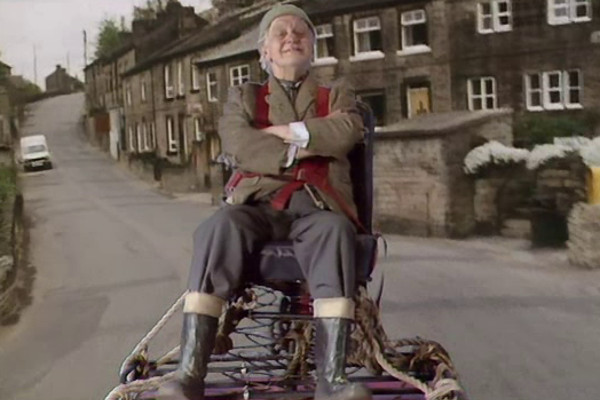
One serious issue often referenced in these articles is that Last of the Summer Wine often doesn't play to its strengths, but against them. The idea of a man in his 70s being in genuine life-threatening conditions is pretty horrific, even in this somewhat slapstick universe, and the realisation isn't quite up to par. Whatever stunts Bill Owen once did himself have been greatly reduced by this point in the series, with stunt doubles (and, here, dummies) often exceptionally obvious.
What's more, after seemingly thinking they got away with it once in the previous series' Who's Looking After The Cafe Then?, we again get Bill Owen in front of a very obvious blue screen to pretend he's on top of a moving vehicle. It's a real lowpoint in an episode that's curiously singular in intent, and oddly reminiscent of similarly poor backscreen work for a "traffic" shot at the end of the Laurel and Hardy short County Hospital. It was far from the only instance of bluescreen in the 9th series... in fact, they used it again just the following week.
Yet if such things are nagging distractions, there is a pleasant feel to the less "showy" aspects of this episode. While Seymour isn't necessarily always likeable as a character, Michael Aldridge's natural charm manages to seep through, and there's multiple instances throughout the episode where his fellow cast members seem to be about to genuinely laugh at his performance. As a result, there are lots of moments where the artifice of the programme seems about to fall, as the cast are also aware of the studio audience, particularly Peter Sallis, whose eyeline disappears across the stands when some lines get bigger laughs than he apparently expected. It's this obvious chemistry between the cast that makes what is a relatively uninspired episode so appealling.
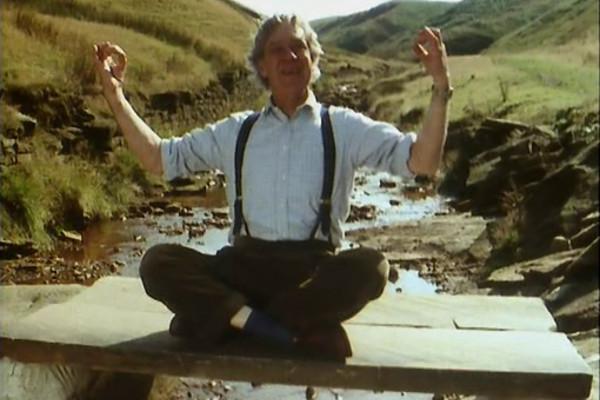
1978's Small Tune On A Penny Wassail saw Compo out of control on a skateboard, and here a similar line of thinking sees the septuagenarian face the hazards of rollerskates. Last of the Summer Wine operates in its own private, cartoon universe, where there's an unofficial rule that anyone trying to cross an empty road must, Wile E. Coyote style, be immediately faced with oncoming traffic or obstructions without warning. That "rule" is put very much to the test here, as legions of cyclists and herds of cows all try to impede Compo's progress.
Seymour is at his most pompous ("I'd like you to look upon me, not just as a friend, but as the nearest you're ever going to get to someone socially very superior") while Compo is at his most coarse, including two jarring uses of the word "crap" on a Sunday teatime. In all, it's a pretty bog (off) standard episode, though does contain more than its fair share of beautiful countryside shots.
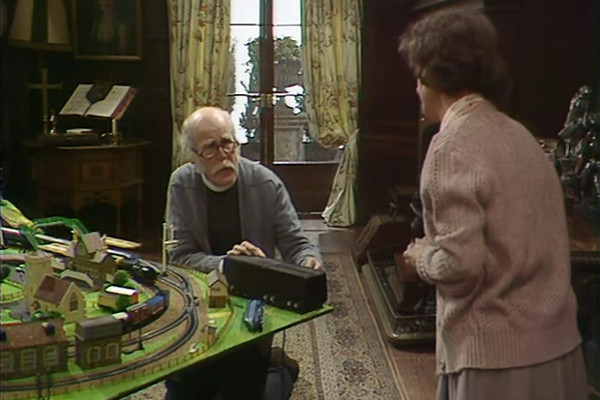
After an opening that's as formulaic as you can get, even for Last Of The Summer Wine, things take a slightly more varied outlook, with Clegg in religious fervour, looking for help from Richard Vernon's disinterested vicar.
Compo's sacrilegious remarks are quite daring for the time, as even as recently as 2018 over half of the UK were still identifying as Christian... a high percentage of which would, you suspect, have been Last of the Summer Wine viewers. However, this is a rare Clegg episode... although, to some extent, the ostensible lead character, he rarely serves as a focal point for a story, particularly in this age of Compo + inventions.
Clegg's sudden fixation on religion is odd, given that a high number of his philosophical ruminations are based around the concept of God, but even in an episode based around him he falls back into the "middle man" role, the "bridge" between Compo and the more dominant third party.
Inevitably it ends with Compo in an outfit, and, with this particular series experimenting more with storylines continuing into the end credits, then there's almost two minutes left when Compo goes on a rampage. However, it doesn't feel like a great payoff, more just a flat end to a somewhat lifeless, yet harmless, 29 minutes.